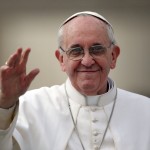In a sharp rebuke to traditional conservative economic thought, the leader of the world’s Roman Catholics says he wants the church to rethink its strategies towards addressing income inequality and poverty and shun “the idolatry of money” and “trickle down” philosophies that give the rich far too much influence.
Pope Francis outlined his thinking in a 50,000 word treatise titled “Evangelii Gaudium” (“The Joy of the Gospel”). The new Pope appears to be a dramatic change in Vatican leadership which has been dominated by theological conservatives since the mid-1960s.
He wrote in his piece: “Some people continue to defend trickle-down theories which assume that economic growth, encouraged by the free market, will inevitably succeed in bringing about greater justice and inclusiveness in the world.
“This opinion, which has never been confirmed by facts, expresses a crude and naïve trust in the goodness of those wielding economic power and the sacralized workings of the prevailing economic system.”
There’s no question the view, written by a man who spend much of his life working with the urban poor of Brazil, is a slap in the face of such contemporary conservative influences, notably Ronald Reagan, who posited in the 1980s that if governments cut taxes and regulation and left the rich alone, the benefits would trickle down to the middle and lower classes.
Since then, the idea has become a mantra for conservatives around the world from Margaret Thatcher to Paul Ryan. It was cited as being part of the “End of History” when the Soviet Union collapsed in 1991. It is also hummed like a Hindu chant on this blog.
In Virginia, the benefits of “trickle down” are assumed to be God’s word among Republicans and Democrats alike. The theory is that business can only flourish in a low tax, low regulation and anti-labor union state. Somehow everyone benefits although as Pope Francis points out these ideas “have never been confirmed by facts.”
Globally, the fast spread of current capitalist thinking by high-speed information technology has created ever wider disparities between rich and poor.
The United States is still struggling to recover from the worst recession since the Great Depression. According to the New York Times, one result of the so-called “recovery” has been similar to the trend in the rest of the world –a small slice of the richer get richer to the detriment of others. The Times writes:
“The top 10 percent of earners took more than half of the country’s total income in 2012, the highest level recorded since the government began collecting the relevant data a century ago, according to an updated study by the prominent economists Emmanuel Saez and Thomas Piketty.
“The top 1 percent took more than one-fifth of the income earned by Americans, one of the highest levels on record since 1913, when the government instituted an income tax.
“The figures underscore that even after the recession the country remains in a new Gilded Age, with income as concentrated as it was in the years that preceded the Depression of the 1930s, if not more so.”
It seems to be the case in Richmond, which is often painted on this blog as a wonderland of bike lanes, “New Urbanism styles,” “the creative class,” and lots of Millennials flocking in to enjoy its exquisite cultural amenities.
In truth, according to Style Weekly, about 50,000 of the city’s population of 208,000 live in poverty. Although the minimum wage is $7.25, workers need to make $10.35 an hour to make ends meet, according to a Massachusetts Institute of Technology study. One pilot workforce training project that served 550 Richmonders over the last three years found that their wages averaged $8.50 an hour. Jamison Manion, who administrates the program, likened the situation to “nothing, absolutely nothing. It’s like draining the ocean through a straw — when it’s raining.”
Pope Francis appears to pose a big change in contemporary Catholic thinking after decades of the status quo. He’s likely to further shake things up by making the ossified Church’s bureaucracy more decentralized, de-emphasizing the overplay on abortion and gay issues and giving women a stronger voice.
A big question is whether the Church is finally ahead of the curve instead of being constantly behind it. In the process, he’s making “Trickle Down” sound “oh-so-1980s.”



